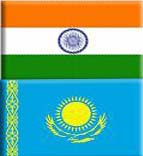Indo-Kazakh ties set for boost during President Nazarbayev''s visit
 New Delhi, Jan. 19 : With just four days to go before Kazakhstan's President Nursultan Nazarbayev arrives in New Delhi for significant bilateral talks with the Indian leadership and to attend this year's Republic Day celebrations as India's chief guest, it is as relevant a time as any to assess Indo-Kazakh ties, both at the bilateral and strategic partnership level.
New Delhi, Jan. 19 : With just four days to go before Kazakhstan's President Nursultan Nazarbayev arrives in New Delhi for significant bilateral talks with the Indian leadership and to attend this year's Republic Day celebrations as India's chief guest, it is as relevant a time as any to assess Indo-Kazakh ties, both at the bilateral and strategic partnership level.
India occupies a special place in so far as Kazakhstan is concerned. Contacts go back to the days when trade was active along the Silk Route that passed from China to the Western world through Kazakhstan.
This route was the bridge between civilizations and carried not only goods, but also progressive ideas.
Cut to the 20th century, and India was among the first countries to recognize Kazakhstan's independence in 1991-92, following the break-up of the erstwhile Soviet Union.
President Nursultan Nazarbayev's first official visit after his country gained independence was to India in 1992, reflecting the importance of New Delhi to Astana. That he is making another visit after 17 years is significant in itself.
At the global level, the interaction between the two countries is close and mutually supportive.
Kazakhstan has also wholeheartedly backed India's candidacy for the UN Security Council Permanent Membership and facilitated India's entry into the Shanghai Cooperation Organization (SCO) as an observer.
Kazakhstan's Ambassador to India, Kairat Umarov, is of the view that "This tradition of mutual support at multilateral organizations continues."
In his report on relations in Eurasia, he says that this support came out clearly on the first day of Nuclear Suppliers Group meeting last September, when Kazakhstan's Permanent Representative made a speech strongly supporting India's case, despite the fact that Kazakhstan had "suffered 500 nuclear tests conducted on its territory by the USSR in the 20th century."
At a bilateral level, Ambassador Umarov is hopeful that the current visit of President Nazabayev will see India supporting Kazakhstan's bid for membership of the WTO.
Insofar as energy cooperation between the two countries is concerned, he says in his report: "We have commercial negotiations going on between KazMunayGas and OVL regarding the exploring the oil in Kazakhstan," and adds that trade ties too have more than doubled - from USD 80 million in 2004 to over USD 332 million in 2008.
Ambassador Umarov says the potential for trade enhancement between the two countries is high, given that Kazakhstan's main exports consist of mineral products; leather, and raw materials, while Indian exports to his country include tea, pharmaceuticals, chemicals, plastic, machinery and equipment.
Both countries are now looking to widen the scope of cooperation to other sectors such as manufacturing, textiles, infrastructure, leatherwear, plastics, pharmaceuticals, IT, oil and gas, tourism, etc.
Kazakhstan is also establishing industrial clusters in tourism, oil and gas machinery building, food processing, textiles, transport logistics, metallurgy and construction materials.
On the other hand, Indian investment to Kazakhstan is currently pegged at USD 38 million, which in itself is indicative of the growing confidence that Indian businessmen have about the Kazakh economy.
Indian companies like Punj Lloyd, OVL, Punjab National Bank and Mittal Steel etc have settled operative establishments in Kazakhstan, while Kazakh companies such as KazStroyService (infrastructure), Kaspain Shelf (oil exploration), TVL (retail equipment) and STL (transportation and logistics).
"In the XXI century, people-to-people contacts hold the key to the success of cooperation. India enjoys great affection among the people of Central Asia thanks to its benevolent image and popular movies," says the envoy in his report.
On the strategic partnership front, the envoy said: "We have all the possibilities for increasing the level of our interaction. We already have military and technical cooperation, developing energy ties, have prospects of increased links in space, nuclear energy.
According to him, the historic NSG waiver opens great vistas for bilateral cooperation, given that Kazakhstan is the world's third largest producer of uranium after Canada and Australia.
It is expected that by 2010, Kazakhstan will become the largest producer of the uranium with the production of 15,400 tons annually, which will be equal to 32 percent of the world's total production.
Ties between the two countries have been institutionalized, and bilateral cooperation mechanisms have been activated to push forward these ties in various fields, such as Inter-Government Commission, Foreign Office Consultations, Joint Working Groups on IT, Oil and Gas, Textile, Transport, Military and Technical Cooperation, Combating Terrorism and Sub-Committee on Science and Technology.
President Nazarbayev''s visit is expected to provide a fresh impetus to enhancing cooperation and friendship between Kazakhstan and India. (ANI)